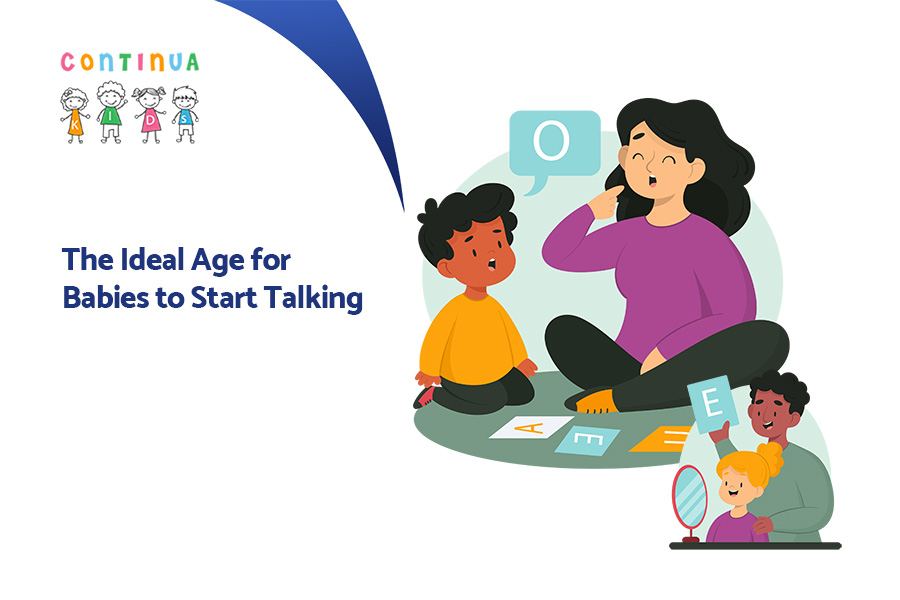
The Ideal Age for Babies to Start Talking
The time in which a newborn learns how to speak is the most cherishing one for the parents. It is massively thrilling when a baby says its first word: it seems like the baby is consciously experiencing the chain of events around them, finally drifting into the world. But, exactly when should the baby start talking? Are there any certain ages that a person should be looking at? What happens if the baby takes just a little longer to start talking?
Let’s get started.
Understanding baby talk when and how it happens
Speaking occurs in a step-by-step manner over time. Below is a simple timeline to give you an approximate idea of what to expect. Each stage is of significant importance in the child’s linguistic development; there are specific ways for parents to help boost the baby’s speech skills.
| Age | What Happens | How to Help |
|---|---|---|
| 4-6 months | Babies start making cooing sounds like "ah" and "ba-ba". | Talk to your baby often. Sing songs and make eye contact. Encourage responses by smiling and imitating their sounds. |
| 6-9 months | Babbling begins. Babies say sounds like "da-da" but not real words yet. | Repeat their sounds. Use gestures like waving and pointing. Introduce simple words like "mama" and "dada" with enthusiasm. |
| 12-18 months | First real words appear, like "mama" or "ball". | Speak clearly. Name objects around the house. Be patient. Play interactive games like peek-a-boo to promote communication. |
| 18-24 months | Vocabulary grows. Babies start forming two-word sentences. | Have small conversations. Read books together. Encourage naming everyday objects and repeating simple phrases. |
| 3 years | Sentences become clearer and longer. | Talk with your child daily. Encourage them to ask questions. Provide choices to promote decision-making and language use. |
Why Do Babies Start Talking at Different Times?
- Genetics: Some children inherit early language skills.
- Hearing ability: Babies who have trouble hearing may develop speech later.
- Environment: Babies who hear more words daily tend to speak earlier.
- Sibling influence: Younger siblings may take longer to talk as older siblings speak for them.
- Gender differences: Studies show that girls may develop speech slightly earlier than boys.
Parents should focus on providing a rich language environment rather than worrying about the exact age their baby starts talking.
Common reasons for late talking in babies
Hearing Problems
- No reaction to sounds may indicate a hearing issue.
- Responding only to loud noises, not voices, could signal hearing loss.
- Lack of sound mimicry by 6 months should be checked.
- Speech development varies among children.
Developmental Delays
- No single words by 18 months may require a doctor’s consultation.
- No two-word phrases by 2 years should be discussed with a doctor.
- Other delays in movement or interaction should be evaluated.
Autism Spectrum Disorder
Signs of speech delay in autism:
- Not responding to their name by 12 months
- Not babbling by 6 months
- No gestures like pointing or waving
- Repeating words instead of using new ones
- Limited eye contact or social interaction
Early identification of speech delays can help in providing the right support.
How Autism Affects Speech
| Sign | What It Means |
|---|---|
| Delayed speech | Words may come later than usual. Some children with autism may not speak until much later. |
| Difficulty with social communication | Difficulty understanding conversations and nonverbal cues, Many autistic children lack communication. |
| Repetitive language | Saying the same words or sentences quite often. |
| Echolalia | Some children keep on repeating words or phrases without understanding what they actually want to say. |
Ways to Help in the Development of Speech in Babies
Talk to the Baby Often
- Speak to the baby during daily activities.
- Use simple words and short sentences.
- Make eye contact to engage their attention.
Read Books Together
- Choose books with colorful pictures and simple words.
- Point to objects and name them.
- Let the baby turn the pages to make reading interactive.
Sing Songs and Nursery Rhymes
- Singing helps babies hear and learn different sounds.
- Repeating songs can improve memory and language skills.
- Use hand gestures to make songs more engaging.
Play Interactive Games
- Games like peek-a-boo encourage social interaction and speech.
- Ask questions and wait for a response.
- Use puppets or stuffed animals to create conversations.
Limit Screen Time
- Too much screen time can delay speech development.
- Encourage real-life conversations instead of watching TV or mobile videos.
Where to Get Help
Continua Kids is a center in Delhi that helps children with autism and speech delays. They offer:
- Speech Therapy to help children learn to talk.
- Behavioral Therapy to improve communication and social skills.
- Early Intervention to support children from a young age.
- Parent Support to guide families through the process.
Early speech therapy can lead to significant progress for a child with speech delay.
Final Thoughts
Every child truly has its own pace in learning to speak. Some children are early speakers, while some may be late speakers. Focus should be on providing a language-rich environment, rather than unnecessarily linking exact times with achievements. Constant input through talking, reading, and playing supports conversation building in the children.
If the baby has not started babbling at the expected age, consultation with a doctor is essential to rule out any medical problem. Support, patience, and early intervention are the key toward fostering language development.
For children with autism or delayed speech, centers such as Continua Kids have the right support to help these children with speech disorders.
Acknowledging and, thereafter, nurturing language development is essential in parenting. Building a positive and interactive learning environment can best work toward enhancing the wholesome use of language in children.
